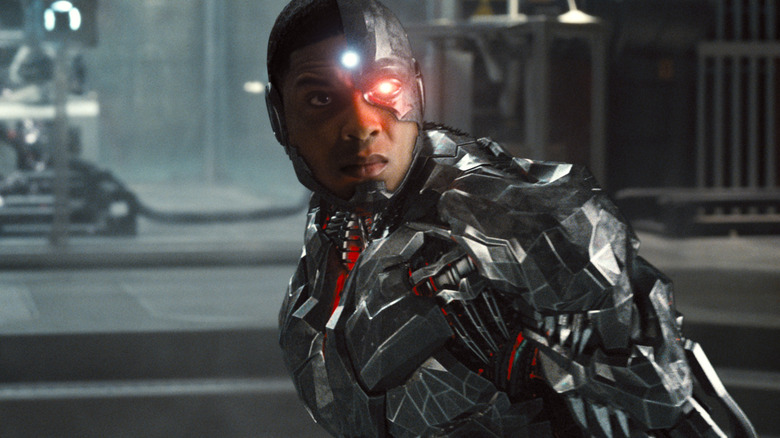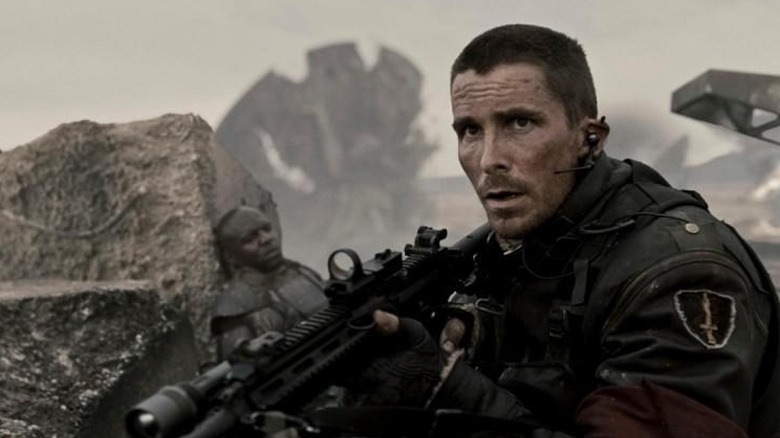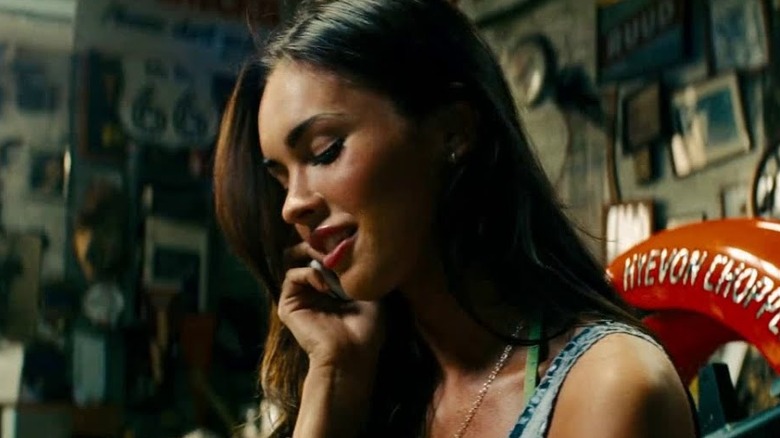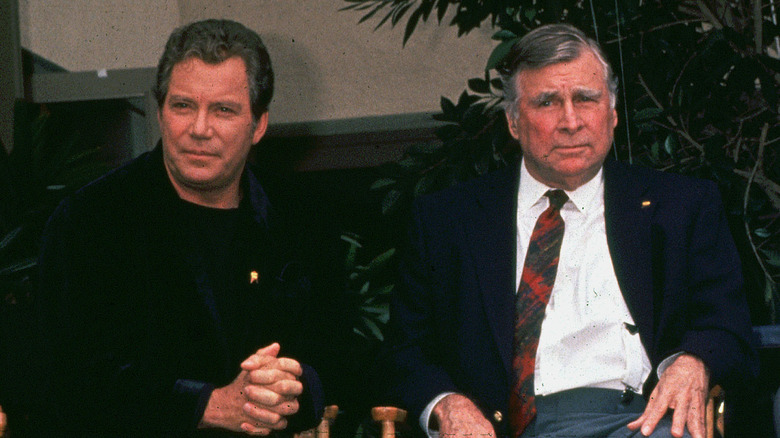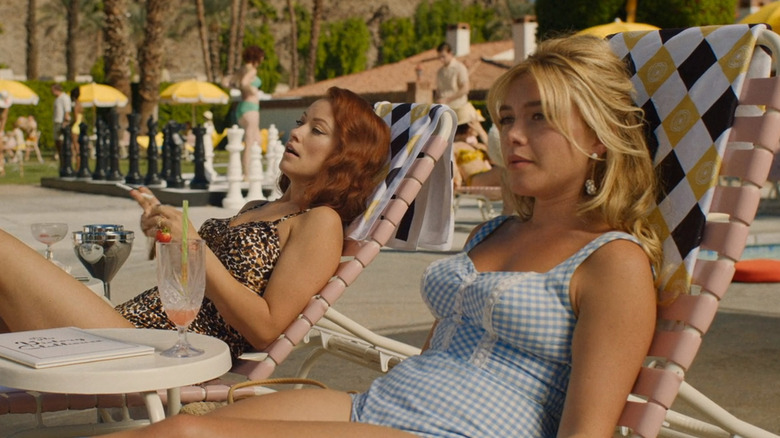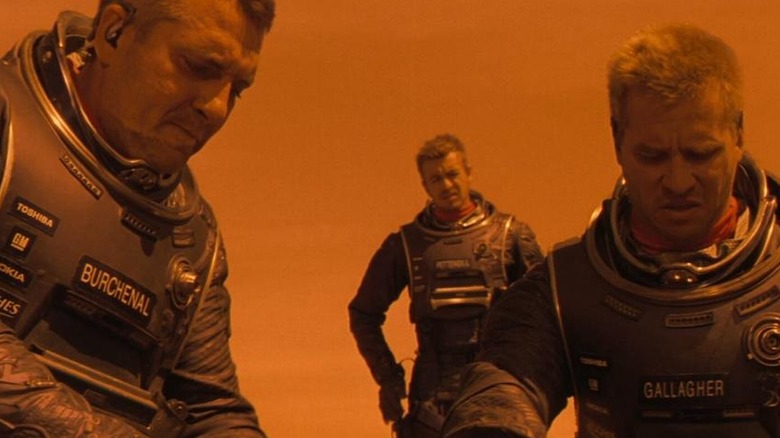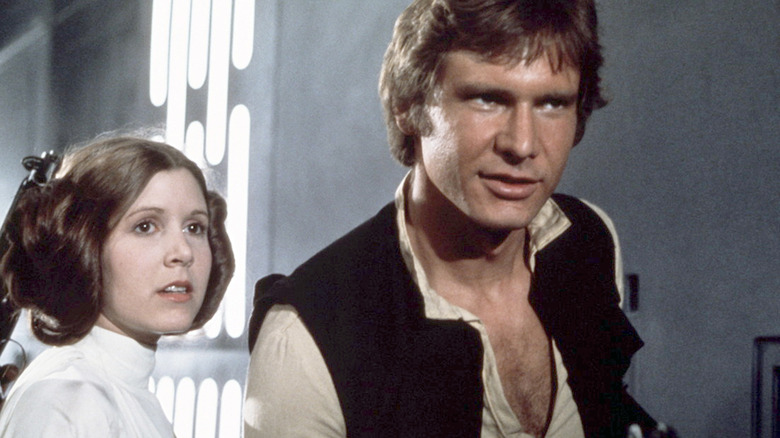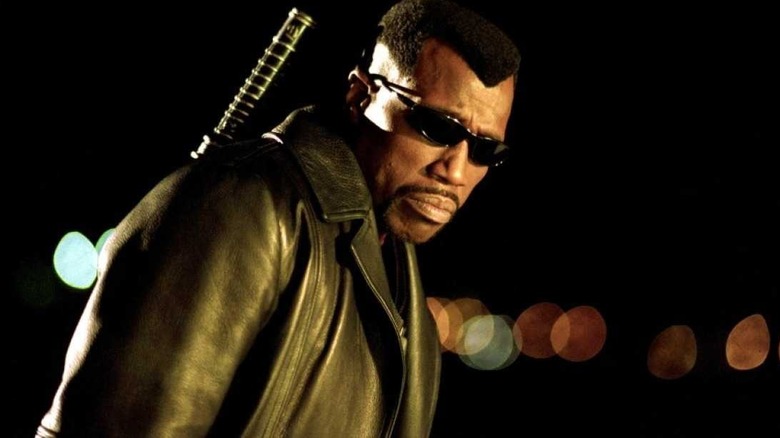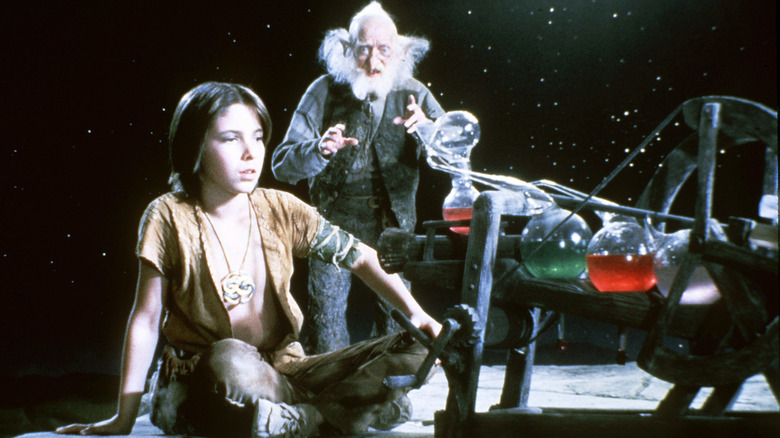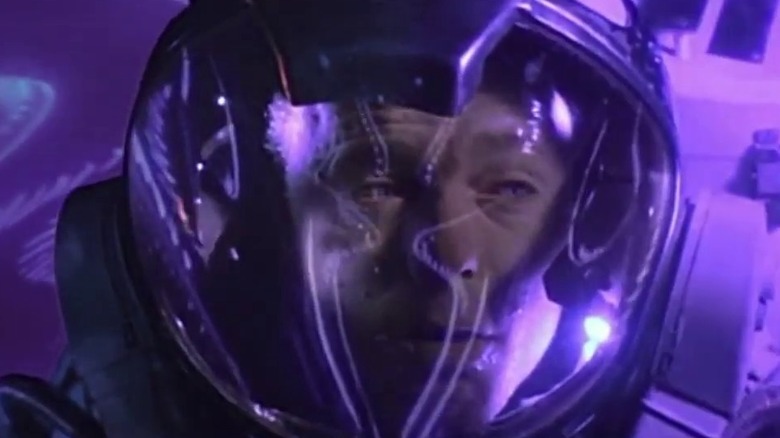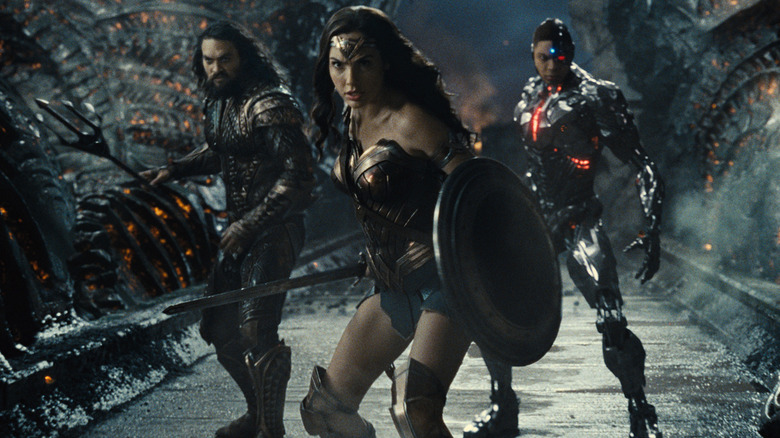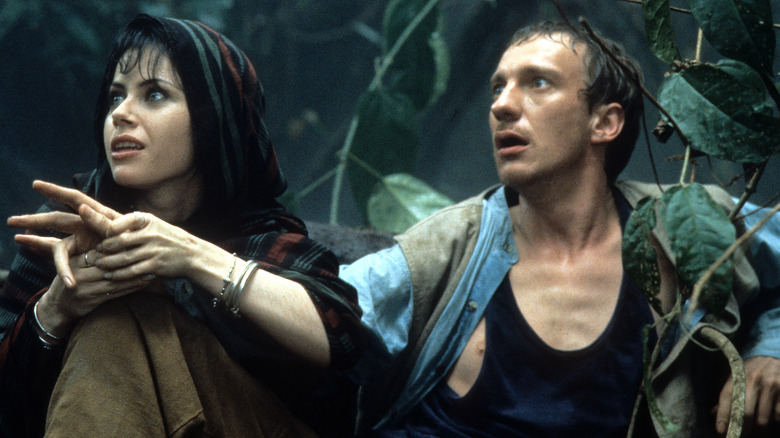The Biggest Scandals On Sci-Fi Movie Sets Explained
Science fiction films can take us to galaxies far, far away or simply present an alternate version of our own world. They can take us many years into the future or feature a different take on the past. Sometimes, they include robots, aliens, or even a dragon or two. There really isn't any true limit to what is possible with sci-fi, with the only significant connecting thread being either a celebration or condemnation — often a combination of the two — of technology and its effects on us.
It's not always easy bringing a sci-fi world to life on-screen. As such, many sci-fi movie productions are fraught with issues, from the earliest planning stages to even post-release, as directors and studios battle over different versions of the final product. There is also a history of problems occurring on sci-fi film sets, as directors battle actors, actors battle each other, and all of them battle the studios. These issues range from petty squabbles stemming from clashing egos to people literally coming close to dying in the service of delivering the final product to the masses. Sometimes, what happened while making a sci-fi movie gets more attention — or is even more interesting — than the film itself.
Terminator Salvation
Christian Bale has amassed an impressive body of work, where the bad films are few and far between — and even then, they're almost always at least interesting in some way. One of the few exceptions is "Terminator Salvation," not only a disappointing entry in its franchise and Bale's career but the worst kind of disappointment in that it's completely generic and forgettable. And if there is one thing that Bale quickly established as a kind of project he typically avoided, it's one that is generic and forgettable.
The making of "Terminator Salvation" was fraught with problems, and to hear Bale tell it, he only accepted the role to spite the studio that wouldn't take no for an answer and the people saying he shouldn't do it. With all that in mind, it's not hard to see how he would've lost his cool at a crew member checking lights in the background of a live shot and distracted him during his performance. But, as evidenced by released audio of the incident, Bale takes it too far, screaming and cursing at the man for several uncomfortable minutes — even as the guy is profusely apologizing and other people can be heard trying to calm Bale down. It's probably something that happens a fair amount on movie sets, but this made headlines because it leaked for the public to hear.
Transformers: Revenge of the Fallen
Director Michael Bay isn't known for subtlety in his filmmaking, and that definitely applies to the way he portrays women. You'd be hard-pressed to find a female lead in a Bay movie who isn't wearing very little clothing and doesn't have the camera most often trained on the area below her neck and above her knees. And it would seem that Bay isn't subtle about how he runs his sets.
In an interview with Wonderland Magazine, Megan Fox discussed her time working with Bay in the "Transformers" franchise, saying, "He's like Napoleon, and he wants to create this insane, infamous madman reputation. He wants to be like Hitler on his sets, and he is. So he's a nightmare to work for." Not long after, an open letter (since deleted but preserved by Deadline) was posted to Bay's website, supposedly written by several anonymous crew members who also worked on "Transformers: Revenge of the Fallen," that slammed Fox, viciously insulting her both professionally and personally. Bay denied involvement in the letter and claimed not to condone it, saying he still enjoyed working with Fox, but it all seemed suspicious. Nonetheless, the damage from Fox's original interview had been done. Bay said word came directly from producer Steven Spielberg to fire her from future "Transformers" sequels because of her reference to Hitler.
Star Trek II: The Wrath of Khan
Beyond the authors who invented sci-fi, one of the most important figures in the genre's history is Gene Roddenberry. As the creator of the original "Star Trek" TV series and "Star Trek: The Next Generation," Roddenberry helped to lay the foundation for countless shows and movies to follow — not to mention he launched a franchise that remains huge to this day, with a whopping five different "Star Trek" shows going simultaneously in spring 2023.
"Star Trek" would also spin off into a long-running film series, though the road to get "Star Trek: The Motion Picture" made was so turbulent that it is a miracle it was even released at all, let alone not an absolute mess of a final product. However, the critical response was tepid, and Paramount blamed much of that on Roddenberry's influence over the movie and his constant tinkering with it throughout production. As a result, he was forbidden from having any real power over "Star Trek II: The Wrath of Khan," given the mostly symbolic title of "executive consultant" and losing direct creative control of the very franchise he had created. That "Wrath of Khan" was released to critical acclaim didn't convince Paramount he should have that power back for subsequent sequels, either.
Don't Worry Darling
Sometimes, the drama that occurs while making a movie overshadows the movie itself. Such was the case with 2022's "Don't Worry Darling," the psychological thriller with a sci-fi twist from director Olivia Wilde. And no, we aren't talking about the pseudo-controversy of "spit-gate" — Chris Pine confirmed that was all nonsense. Instead, the two actual scandals that arose around "Don't Worry Darling" involved Florence Pugh, who plays the film's lead character, Alice.
The first concerns Shia LeBeouf's exit from the project, which became he said/she said as to whether he quit the movie voluntarily or was fired. LeBeouf claims he quit, but Wilde said that LeBeouf and Pugh were not getting along. When it was apparent their working relationship was irreparable, one had to go, and Wilde chose to axe LeBeouf. Either way, it became the most talked-about aspect of the movie ahead of its release. That is, until rumors of a tumultuous on-set relationship between Pugh and Wilde surfaced, reportedly stemming from Pugh not approving of Wilde's budding romance with Harry Styles. The fact that Pugh seemed to avoid interacting with or even looking at Wilde at press events lent credence to this, as did the fact that Pugh complained about how much attention her sex scenes were getting — seen as a response to Wilde frequently touting those sex scenes and how proud she was to include them.
Red Planet
Val Kilmer has a reputation for being difficult to work with. Tom Sizemore had a well-documented tendency toward a violent temper. So maybe putting those two together as the leads of the 2000 sci-fi action movie "Red Planet" — especially at a time when Kilmer was fighting to maintain his floundering A-lister status as Sizemore was gradually developing that status himself — wasn't the best idea. It was clearly a bad experience for first-time director Antony Hoffman, who has yet to direct another feature.
As the story goes, Kilmer learned that Sizemore had his personal exercise equipment delivered to the set on the studio's dime. That incited a fair bit of jealousy in the "Top Gun" star. Kilmer lashed out at Sizemore, pointing out that his paycheck was five times bigger in an effort to flex what he saw as evidence of being the bigger star. In response, Sizemore did some flexing of his own by throwing a 50-pound weight at Kilmer. They subsequently refused to be on set together, and body doubles were used for any scenes that needed both of their characters to appear on-screen at the same time. Producers knew that a physical altercation was inevitable and pleaded with Sizemore to at least avoid Kilmer's face when the punches started flying. Sure enough, Sizemore would eventually slug Kilmer right in the chest.
Star Wars: Episode IV — A New Hope
It's one of the most famous love stories in all of sci-fi — smooth-talking smuggler Han Solo (Harrison Ford) eventually wins the heart of Alderaan princess Leia Organa (Carrie Fisher) over the course of the original "Star Wars" trilogy. The sequel films later revealed their relationship resulted in marriage and a child, but also that things didn't culminate in a fairytale ending.
It's just as well, given that the actors had a relationship that was anything but storybook. In her 2016 memoir "The Princess Diarist," Fisher confessed that she and Ford had a three-month affair while shooting "Star Wars: Episode IV — A New Hope," which wasn't the most appropriate for several reasons. Ford was 33 years old at the time, while Fisher was only 19. But more unfortunate was that Ford was married with two children while he was seeing Fisher. Fisher said that the two maintained their relationship until finishing filming the first "Star Wars" movie, becoming — and staying — just friends after that.
She claims she sent Ford a manuscript of "The Princess Diarist" before it was published so he could have the chance to object to anything she said about him in it. He said nothing, so she went for it. The famously private Ford has mostly declined to comment on it, as he does most aspects of his personal life.
Blade: Trinity
In the lead-up to the Marvel Cinematic Universe, plenty of movies based on properties from the famed comic book publisher were released throughout the '90s and early-2000s. While there were some major missteps along the way, a few managed to be a hit with fans and helped show Hollywood that there was indeed still money to be made on comic book movies — something that especially needed proving to an industry that was still smarting on the box office nosedive the "Batman" movies had previously taken.
Before "Spider-Man" and "X-Men," there was 1998's "Blade," starring Wesley Snipes as the titular half-vampire vampire hunter. Appreciated for taking a much darker and more violent tone than most superhero movies up to that point, "Blade" was a huge hit that ended up becoming a franchise with two additional films and a sequel TV series. Unfortunately, to hear "Blade: Trinity" co-star Patton Oswalt tell it, Snipes was a bit over the whole thing by the third movie. Oswalt claimed that in addition to Snipes frequently holding up production as he relaxed in his trailer and seeming mostly disinterested even when he was on set, Snipes frequently butted heads with director David S. Goyer and eventually tried to strangle him. It got so bad that Snipes would eventually only talk to Goyer via handwritten sticky notes.
The NeverEnding Story
Many Gen Xers and older Millennials have fond memories of childhoods spent watching "The NeverEnding Story," the 1984 sci-fi fantasy film about a boy who finds the titular book and soon discovers he's a character within the book and that its events are happening in real-time as he reads it. It was adapted from the novel of the same name by German writer Michael Ende, released five years prior. While the book did well, especially in its native Germany, most of the English-speaking world is far more familiar with the film — a fact that caused Ende a significant amount of anger and disappointment.
The movie's director, Wolfgang Petersen, had initially invited Ende to be involved in the production and seemed to value the author's input. But Ende claimed that the movie's script was significantly different than the version he approved and that he wasn't asked or told that the screenplay had been so heavily rewritten before it was too late. He was so disgusted by the direction the movie was going in that he even tried to sue for breach of contract in an effort to halt production. He was unsuccessful in that regard, and the movie was finished and released without his blessing, with his only recourse being to have his name removed from the film.
The Abyss
It's clear from his last few movies that filmmaker James Cameron is fascinated by water, but the fruits of that interest actually have roots back to the 1980s. In the last year of that decade, after "Aliens" and between "Terminator" installments, Cameron wrote and directed "The Abyss." What initially seemed like a movie merely about recovering a sunken submarine eventually revealed itself to have a much more sci-fi-heavy bent, making it have far more in common with "Avatar" than "Titanic."
It's hard to fully know why "The Abyss" has become one of Cameron's lesser-known films despite strong reviews and an Oscar win for its visual effects. But some of it might have to do with Cameron and star Ed Harris' reluctance to talk or reminisce about the movie, given what a nightmarish shoot it was. Both men almost drowned in separate incidents during production, as did co-star Michael Biehn. These days, a lot more of the effects would've been done with computers, but this was 1989, and most of it had to be done practically in massive tanks full of actual water. It was extremely difficult for everyone involved — multiple actors admitted to having physical and emotional breakdowns while making the movie. After the initial marketing push, Harris vowed to never discuss "The Abyss" again and largely didn't for about 25 years.
Justice League
These days, Joss Whedon seems to be pretty thoroughly canceled — by most accounts, it's well-deserved. The first major cracks in his reputation started to form after the release of "Avengers: Age of Ultron." Whedon faced backlash for how Black Widow (Scarlett Johansson) was portrayed as little more than the sum of her physical, feminine parts. This was followed by the leak of his scrapped "Wonder Woman" script two years later, which featured more of the same. But it wasn't until his ex-wife wrote a guest piece for The Wrap in 2017, accusing Whedon of multiple affairs while making the "Buffy" TV series and blasting him for not being the feminist he claims to be, that the backlash against the filmmaker turned personal.
Over the next few years, the accusations began piling up from actors and crew members who had worked with Whedon on various projects. They said he was abusive, manipulative, and otherwise toxic on set. It all reached a boiling point when Ray Fisher, who worked with Whedon on "Justice League," tweeted that the director's "on-set treatment of the cast and crew of Justice League was gross, abusive, unprofessional, and completely unacceptable." Jason Momoa and Gal Godot came out not only to support Fisher but also to confirm that Whedon made the experience of filming "Justice League" extremely unpleasant. Six years later, Whedon has yet to make another film.
The Island of Dr. Moreau
"The Island of Dr. Moreau" was basically a scandal unto itself. It is definitely among the movies with the worst cycles of development hell that actually was finished and theatrically released by a major studio. But this feature isn't just about all the things that went wrong on film sets. It's about actual scandals. And it's not hard to choose which scandal to focus on.
Despite being the one to initially champion the project and sell the studio on making it, original director Richard Stanley was fired from the production after only three days of shooting. Things had become an absolute mess on the shoot already, not the least of which were issues with the behavior of stars Marlon Brando and Val Kilmer. Stanley took the brunt of the blame for that, being accused of failing to keep control of the set and his actors.
But that's not even the wildest part. The studio offered Stanley his originally agreed-upon salary for directing the movie on the condition he not speak to the press and leave the set without incident. Stanley then basically disappeared into the jungle, and nobody could find him. He wound up still being part of the movie anyway. He disguised himself as an extra and snuck back onto the set. He appears in the finished film as a dog man.
